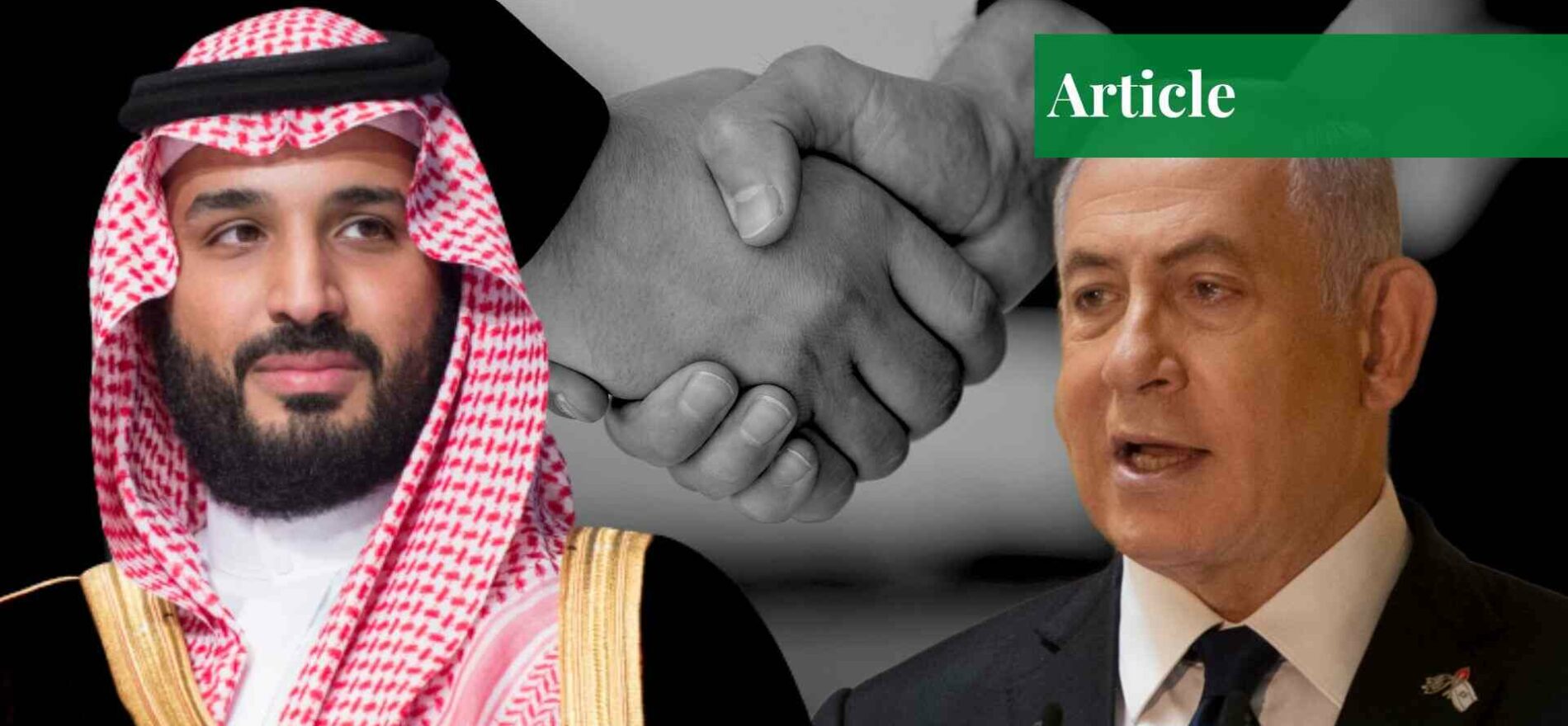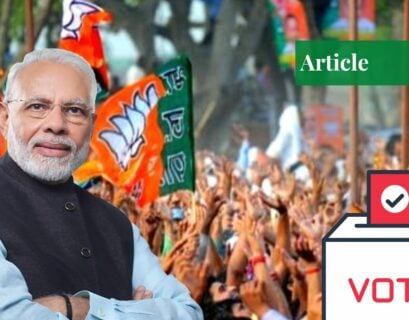Hafsa Ammar is a graduate of the National Defence University, Islamabad. Her areas of expertise are narrative building and propaganda warfare, centered around the Soviet Union and modern-day Russia.
UN 78th General Assembly Session
Prime Minister Benjamin Netanyahu addressed the UN General Assembly on 22nd September 2023 as he held up a map to showcase the ‘New Middle East’. As is a pattern of UN history, the map caused great distress as it completely erased any trace of Palestine. The portion highlighted blue which was supposed to represent Israel, included the Palestinian territories of Gaza and the West Bank; even the Syrian-occupied Golan Heights under Israeli boundaries.
Although the prime minister held up the map to try and show growing relations and peace between Israel and other Arab neighbors; it was made clear that the goal was to eliminate the presence of Palestine.
Israeli Stance
PM Netanyahu stated that this budding peace between Saudi Arabia and Israel would give way to a new Middle East, one that would no longer be haunted by the Arab-Israeli conflicts of the past. He invoked both major religions – Judaism and Islam – explaining how they encourage good relations and that this deal would be sacred for both. He went as far as to say that this deal would also bring peace to Palestinians.
Despite the neighborly act that he put forth, his and his nation’s disdain for Palestinians shone through. Exclaiming with a vehemence that Palestinians should not be given the right to veto this Arab-Israeli deal, he proved that Israel wants Palestinians to be part of the peace but not a party to it. Israel does not want the Palestinian Authority to have any say or sway in this deal.
Khalid Elgindy, a scholar from a Middle Eastern think-tank, reported that he thinks Israel is incapable of making any concessions for the Palestinian Authority because they are against the very concept of the nation.
On 26th September, Israeli Minister of Tourism, Haim Katz, went to Saudi Arabia to participate in the United Nations World Tourism Organization Conference. It is a historic visit as no Israeli minister has set foot in Saudi Arabia before this. He was quoted saying that ‘Tourism is a bridge between nations’ and there is hope that this visit is the first of many in this alliance being established.
Saudi Stance
Saudi Arabia is playing an interesting game; it has all parties – the US, Israel, and Palestine – invested in this alleged peace deal of the decade. Mohammed Bin Salman is dealing with this pact quite strategically. What does Saudi Arabia seem to gain from this deal? It is getting security guarantees, that is, defense pacts from the US. America vows to not only lessen the restrictions on Saudi arms dealings but also to help Riyadh set up its civilian nuclear program.
Saudi officials are going as far as saying that any deal they make will include some form of progress toward the creation of a Palestinian state. As Saudi Arabia represents the focal point for all Muslim states, it needs to make sure that any political deal that it makes with Israel does not unleash a wave of unrest and protests in the Muslim world.
To bring legitimacy and credibility to this ‘peace deal,’ Saudi Arabia desperately needs the support of the Palestinian Authority. To gain support, Riyadh has put forth an offer to resume financial aid to the Palestinian Authority. The aid had been constant since 1948, till it started to slow down in 2016, and officially dropped to zero in 2021. Palestine is constantly under siege due to its aggressive colonizer and is in dire need of funds.
As the Israeli Minister for Tourism landed in Riyadh, in its parallel, the Palestinian Authority welcomed the first Saudi Ambassador to Palestine, Nayef Bin Bandar Al-Sudairi. Arriving in the West Bank on Tuesday, Al-Sudairi met with multiple Palestinian officials and political figures. He went on record to say that Saudi Arabia is working towards establishing a Palestinian state which would have East Jerusalem as its capital.
If accomplished, this would be nothing short of a miracle as Israeli politicians (and nationals) are vehemently against the concept of Palestine as a state. Israeli Finance Minister Bezalel Smotrich has gone as far as saying that there is no such thing as ‘Palestine’ or ‘a Palestinian people’.
American Stance
Why is America gunning for peace between the two nations? Saudi Arabia and Israel are both close allies of the US and this collaboration has become a ‘top policy goal’ for America. Experts have deduced that President Biden does not think that the Palestinian plight for recognition is at the center of the unrest and war that has the Middle East in its grip, but rather the lack of acceptance that the Arab states have for Israel is what is feeding the faultlines.
Although the US has been a vocal critic of Netanyahu’s government on occasion, the Israeli Prime Minister praised Biden’s involvement in brokering this peace deal and said that American efforts for this alliance have been indispensable.
Palestinian Stance
The last time Arab states moved to ally with Israel was in 2020 under the Abraham Accords, a series of agreements that took place to normalize relations between Israel and several Arab States such as the UAE, Bahrain, Morocco, and Sudan. As always, the US aided in the accords and incentivized the states; it made a deal to provide 50 F-35 jets to the UAE and vowed to reduce the severity of the sanctions on Sudan.
In 2020, the Palestinian Authority lashed out, stating that these states were stabbing the Palestinian cause and the people in the back. This year, however, the PA has had a more pragmatic response. As they know that Saudi Arabia needs acceptance and support from the Palestinian Authority to go forward with this peace deal, certain conditions were put forth by the officials when they made an official visit to Riyadh-
- The reopening of a US consulate in Palestine as the last one was closed in 2019 by then President Donald Trump.
- United States to back Palestinian Representation in the United Nations.
- More territorial control in the West Bank and the freezing of Israeli settlements.
- Cash boost in millions of dollars.
This attempt at establishing friendly relations with Israel has come at a precarious time and Saudi Arabia needs to be cautious as it is dealing with perhaps the most aggressive, right-winged, and pro-Zionist government that Israel has seen to date.
If you want to submit your articles, research papers, and book reviews, please check the Submissions page.
The views and opinions expressed in this article/paper are the author’s own and do not necessarily reflect the editorial position of Paradigm Shift.


















